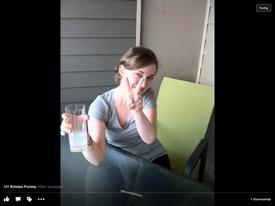Should a morbidly obese person eat back exercise calories?
Replies
-
I think the advice to only eat them if you are weak from hunger is good. Also if you eat them back (I do most always) try to limit it to half of your exercise calories (something I try to do but not always successfully). You want to diet in a sustainable way though. It's better to lose slowly in a way you can maintain then to be radical but not be able to keep it up. Listen to your body and only eat when you need to. I think all of us got to MFP because we weren't doing that and ate for reasons other than hunger! Good luck you are doing a good job!0
-
Yes!!! YES YES YES!!! I can not say YES enough! When you are working out hard your body needs the nutrients to maintain the muscles and calories you have burned! When you don't eat your body goes into starvation mode and starts storing the fats, thus causing you to gain or plateau. I know, this happened to me. I work out at the gym 6 days a week and eat 1500 calories a day. Eating little meals every 2-3 hours is a MUST this way your body knows it will be fed and wont store any fats! Limit your carb intake after 5pm in other words try to eat all of your carbs in the morning to early afternoon. I hope this helps! Good Luck!!! :bigsmile:
Im sorry but this is not necessarily the case for someone who is morbidly obese, their body has a lot of extra fat to burn if needed and is unlikely to start diminishing muscle stores.
Your body doesnt 'know' when its going to be fed and this will not overnight make it start clinging on to all the extra weight someone obese has.0 -
I didnt during weightloss...IMO if you want the weight off..dont go there.
being in maintenance the last while i have been testing that lol n i see how it works n is beneficial....its something you have to be in tune with everything n watch...and learn to know exactly how much you can get in, exercise n stay the same or lose.0 -
remember though...during weightloss one must keep their protein between 60-80 grams at least to preserve lean muscle mass.0
-
The best advice I've seen on here is this:
"If you are hungry, eat. If you're not, don't"
I wouldn't plan the food on my exercise days, I just eat when I'm hungry. I don't see exercise as there so I can eat extra (don't need help there thanks) but rather, lose more - that's your goal right?0 -
I tend to eat about half my exercise calories, I haven't ever plateaued doing it this way. If you do not eat any of them, as you ramp up your exercise program you will slow your metabolism.0
-
Any feedback is appreciated.
I've been following the MFP diet plan and exercising for over 13 weeks, now. Eating back my exercise calories has worked just fine for me, up until a month ago. In the past 3.5 weeks, I've only lost 1.2 pounds. However, I added strength training to my exercise routine right around the same time my weight loss has slowed.
Your thoughts? I really want to get back to losing 2 pounds a week.
I don't think there's an easy answer to this question.
On the one hand, morbidly obese people can do well on very low calories plus exercise in comparison to people closer to ideal weight. They have more fat storage to tap into for energy. Plus it's probably more important for you to lose weight rather than preserve most of your muscle mass (as someone close to their goal weight is).
On the other hand, keeping your calories at a higher level will give you more wiggle room down the road. Plus, you'd be more likely to stick with the diet longer and have more energy.
So, no, you don't need to eat them back. But MFP generally overestimates the calories burned. I'd recommend eating only 3/4 of these back generally. And, as you exercise more, your body performs the exercise more efficiently, so you tend to burn less doing the same. To combat this, make sure you increase the intensity of the exercise gradually. E.g., if you are using an elliptical, increase the level by 1 step each week (or two). I would suggest doing this and maybe eating 50-100 less than you are now and see how things go. Give it time (3-4 weeks) to check results.
Also, have you been adjusting your goals as you lose weight? Your calorie needs will decrease as you lose and you should adjust your goals at least every 10 lbs (I do it every 5).
My last thought is that your body/mind reacts to a diet by trying to convince you to move less to preserve energy. You may feel lazier, less fidgety, colder, etc. For example, if you exercised that day, don't listen to your brain telling you that you can take the elevator instead of the stairs because you "burned enough today." Some of this reaction is subconscious, so it can't really be helped. But stuff like the stairs vs. elevator dilemma are not.0 -
The best advice I've seen on here is this:
"If you are hungry, eat. If you're not, don't"
I wouldn't plan the food on my exercise days, I just eat when I'm hungry. I don't see exercise as there so I can eat extra (don't need help there thanks) but rather, lose more - that's your goal right?
This advice is a way oversimplification. If it were that simple, people would have an easy time dieting and losing weight. Plus, if you are that in tune with hunger, then presumably your body would tell you to eat at your TDEE. So some physiological hunger is normal on a diet, and needs to be dealt with.
Plus "hunger" is both physiological and psychological. People with a lot of extra weight generally have strong psychological hunger, causing them to overeat. Sometimes people can not only overcome, but make their physiological hunger disappear (at least for some time). Many people claim to not be hungry at all when they start a 1000 calorie diet. Anorexics will claim to not experience hunger any more. Now, maybe you could say that these people have confused themselves by not listening to their hunger signals. But that's kind of the point. We do confuse the signals and that's how we get fat.0 -
I think most of us know or can learn when we're hungry at the body level and not the mouth/mind. It's like our body's hunger/fullness is a tiny voice we've learned to tune out. You can tune back into it but you have to stop and listen sometimes for a minute and not check some web site calculator to see if you're supposed to eat more.0
-
Don't worry it is muscle. I had the same thing happen when I started lifting heavy. The numbers will eventually start dropping faster.0
This discussion has been closed.
Categories
- All Categories
- 1.4M Health, Wellness and Goals
- 398.5K Introduce Yourself
- 44.7K Getting Started
- 261K Health and Weight Loss
- 176.4K Food and Nutrition
- 47.7K Recipes
- 233K Fitness and Exercise
- 462 Sleep, Mindfulness and Overall Wellness
- 6.5K Goal: Maintaining Weight
- 8.7K Goal: Gaining Weight and Body Building
- 153.5K Motivation and Support
- 8.4K Challenges
- 1.4K Debate Club
- 96.5K Chit-Chat
- 2.6K Fun and Games
- 4.8K MyFitnessPal Information
- 18 News and Announcements
- 21 MyFitnessPal Academy
- 1.5K Feature Suggestions and Ideas
- 3.2K MyFitnessPal Tech Support Questions







